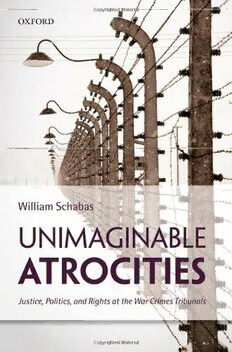
Unimaginable atrocities : justice, politics, and rights at the war crimes tribunals PDF
Preview Unimaginable atrocities : justice, politics, and rights at the war crimes tribunals
Unimaginable Atrocities This page intentionally left blank UNIMAGINABLE ATROCITIES Justice, Politics, and Rights at the War Crimes Tribunals William Schabas OC MRIA 1 3 Great Clarendon Street, Oxford OX2 6DP United Kingdom Oxford University Press is a department of the University of Oxford. It furthers the University’s objective of excellence in research, scholarship, and education by publishing worldwide. Oxford is a registered trade mark of Oxford University Press in the UK and in certain other countries © William A. Schabas, 2012 The moral rights of the author have been asserted First Edition published 2012 All rights reserved. No part of this publication may be reproduced, stored in a retrieval system, or transmitted, in any form or by any means, without the prior permission in writing of Oxford University Press, or as expressly permitted by law, by licence or under terms agreed with the appropriate reprographics rights organization. Enquiries concerning reproduction outside the scope of the above should be sent to the Rights Department, Oxford University Press, at the address above You must not circulate this work in any other form and you must impose this same condition on any acquirer Crown copyright material is reproduced under Class Licence Number C01P0000148 with the permission of OPSI and the Queen’s Printer for Scotland British Library Cataloguing in Publication Data Data available Library of Congress Cataloguing in Publication Data Data available ISBN 978–0–19–965307–2 Typeset by Newgen Imaging Systems (P) Ltd, Chennai, India Printed in Great Britain on acid-free paper by CPI Group (UK) Ltd, Croydon, CR0 4YY To Ben Ferencz, who was there when it all began This page intentionally left blank CONTENTS Introduction 1 1. ‘Unimaginable Atrocities’: Identifying International Crimes 25 2. Nullum Crimen Sine Lege 47 3. Victors’ Justice? Selecting Targets for Prosecution 73 4. The Genocide Mystique 99 5. Mens Rea, Actus Reus, and the Role of the State 125 6. History, International Justice, and the Right to Truth 153 7. No Peace Without Justice? The Amnesty Quandary 173 8. Crimes Against Peace 199 Index 223 This page intentionally left blank INTRODUCTION ‘I had a great evening; it was like the Nuremberg Trials.’ Mickey (Woody Allen), after a rather grim date with Hannah’s sister Holly in the fi lm Hannah and Her Sisters Human history is marked by ‘turning points’, associated with the emergence of new technologies, new forms of government, and new concepts. They are signposts of the progress of humanity. Centuries from now, the Nuremberg trial will be seen as one such defi ning moment, if it is not already. In the Middle Ages, the Bavarian city of Nuremberg was the unoffi cial capital of the Holy Roman Empire. Hitler chose it as the site for his hysterical ral- lies. He built an enormous parade ground there that still exists. It is now a monument to Nazi atrocity. Above all, the town today evokes notions of justice. This was where the International Military Tribunal, established by the Allies in the weeks following the unconditional surrender of Germany in 1945, put the surviving leaders of the Nazi regime on trial. It is enough to say ‘Nuremberg’ for the idea to be understood. Nuremberg stands for several big and infl uential concepts. Speaking to the American Bar Association in 1946, British Prosecutor Hartley Shawcross proposed three of them: to initiate a war of aggression is an international crime; individuals who lead their countries into such a war are personally responsible; individuals therefore have international duties which transcend the national duty of obedience imposed by particular states when to obey would constitute a crime against the law of nations. To this list, one other, drawn from the human rights movement that was also emerging at the time, might be added: atrocities committed by a gov- ernment against its own people are punishable as an international crime. Nuremberg also contains the suggestion that international responsibility is imposed upon states to ensure that perpetrators of international crimes are brought to justice.
